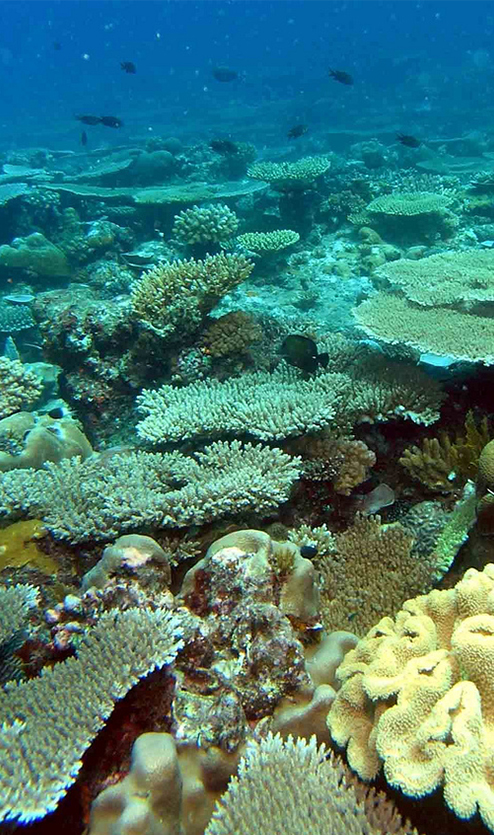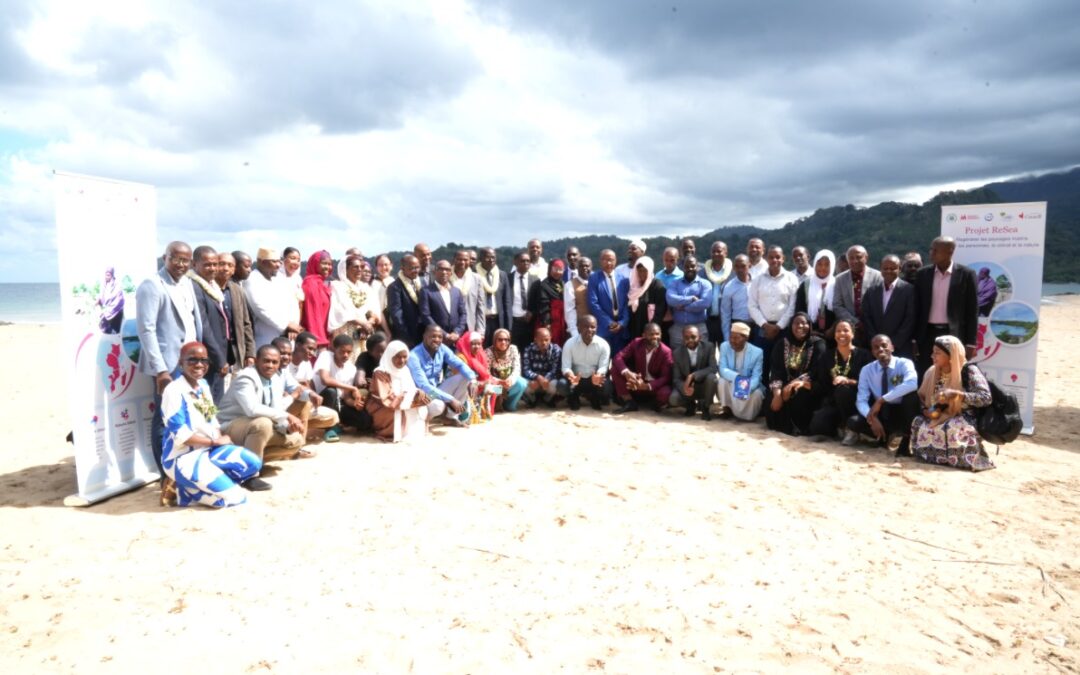Today, the Regenerative Seascapes for People, Climate and Nature (ReSea) Project was launched at Nioumachoua, Moheli, Comoros, gathering representatives from central and local government, civil society organizations, development partners and community members.
The project is implemented by the International Union for Conservation of Nature, Mission inclusion and local women’s organization Plateforme Femmes, Développement Durable et Sécurité Alimentaire (PFDDSA) with the Government of the Union of Comoros and the Moheli Governorate, with the support of Global Affairs Canada under the Partnering for Climate commitment which advances the implementation of the Environment and Climate Action Area of the Feminist International Assistance Policy (FIAP).
ReSea aims to enhance the physical and socio-economic resilience of coastal communities including women and youth, the vulnerable and marginalized in Comoros, Madagascar, Mozambique, Tanzania and Kenya. In Comoros, the project will be implemented in Nioumachoua Village, Moheli, in the heart of the Moheli National Park.
ReSea aims to enhance the physical and socio-economic resilience of coastal communities including women and youth, the vulnerable and marginalized in Comoros, Madagascar, Mozambique, Tanzania and Kenya. In Comoros, the project will be implemented in Nioumachoua Village, Moheli, in the heart of the Moheli National Park.
ReSea is anchored to the Western Indian Ocean-led and Africa-driven Great Blue Wall (GBW) initiative, which seeks to accelerate and expand ocean conservation actions while enhancing socio-ecological resilience and developing a regenerative blue economy by catalysing political leadership and financial support.
ReSea is anchored to the Western Indian Ocean-led and Africa-driven Great Blue Wall (GBW) initiative, which seeks to accelerate and expand ocean conservation actions while enhancing socio-ecological resilience and developing a regenerative blue economy by catalysing political leadership and financial support.
This will be achieved by establishing a connected network of nature and people-positive regenerative seascapes, driving effective, community-anchored conservation and restoration measures whilst fostering a regenerative blue economy.
“The concept of the Blue Economy, which offers the potential for achieving sustainable and sustained economic growth based on ocean resources, is beginning to attract strong interest from countries like Comoros, a small island nation with vast exclusive economic zones,” said National Focal Point for Blue Economy, General Directorate of Fisheries Resources Dr Thabiti Soudjay Kamal.
Canada’s High Commissioner to Comoros, Seychelles, Tanzania and Zambia Kyle Nunas said, “With an investment of over 1.7 billion Comorian Francs (CF) ($5.2 million) in Comoros, this project will help build the resilience of coastal communities to growing environmental challenges.
This investment demonstrates Canada’s active and dedicated commitment to climate action, thanks in part, to solutions that were developed ‘for’ and ‘by’ African communities.
Canada has committed to provide $5.3 billion in climate finance between 2021-26 with the aim of helping developing countries fight climate change
“IUCN’s mission is to influence, encourage and assist societies throughout the world to conserve the integrity and diversity of nature and to ensure that any use of natural resources is equitable and ecologically sustainable,” explained IUCN ESARO’s Coastal and Ocean Resilience Regional Programme Manager, Dr Elinasi Monga.
“This project we are launching here today is a flagship project under the Great Blue Wall initiative. An initiative that aims at accelerating ocean conservation at scale, management of critical ecosystems such as mangrove seagrass and coral reefs, and upscaling a regenerative blue economy for improved livelihoods. It responds to the Comoros’ priorities laid out in its Blue Economy Agenda, considering that the ocean sector has been prioritized as a pillar to economic development. The country and the President have also been on the forefront promoting a sustainable ocean economy, having hosted the first ministerial conference on The Blue Economy and Climate Action in Africa in Moroni in 2023. IUCN is committed to support the country to achieve its mission and ensure that we all achieve a just world that values and conserves nature.
“ReSea exemplifies how empowering women’s leadership can drive transformative change in coastal communities,” said Andréanne Martel, Program Manager for ReSea at Mission inclusion. “By partnering with local women’s organizations like PFDDSA, we’re nurturing champions for women’s rights and environmental protection. This approach ensures that women and girls are at the forefront of building climate resilience and sustainable livelihoods in their communities.”
PFDDSA National President Moinaecha Ahamada remarked, “The promotion of gender equality, sustainable development and food security at national level and in the Indian Ocean region is at the heart of the actions of the Platform for Women’s Sustainable Development and Food Security (PFDDSA). The ReSea project is perfectly suited to this mission, and in partnership with Mission Inclusion and IUCN, PFDDSA is delighted to be applying its expertise to strengthen the physical and socio-economic resilience of Comorian coastal communities. This project will further strengthen the perception of the use of coastal resources. This will be achieved by encouraging the population to protect the environment, introducing good conservation practices, developing socio-economic activities to combat social inequalities and empowering women in an environment that respects nature.”
About the International Union for Conservation of Nature (IUCN)
About the International Union for Conservation of Nature (IUCN)
IUCN, the International Union for Conservation of Nature, is a membership union composed of governments, civil society organizations and IPLC representatives. It harnesses the experience, resources, and reach of its more than 1,400 Member organizations and the input of more than 15,000 experts. IUCN is the global authority on the status of the natural world and the measures needed to safeguard it. Working in Mozambique for over 20 years, IUCN has been a strategic partner for the Government of Mozambique, supporting the development and implementation of the biodiversity legal framework, delineation of Key Biodiversity Areas in Mozambique, development of the spatial planning framework, Nature-based Solutions for climate change adaptation in terrestrial, coastal and marine ecosystems, as well as gender inclusion in agro and blue economy value chains.
About Mission inclusion
About Mission inclusion
Building on 75 years of experience, Mission Inclusion pursues Cardinal Leger’s dream of a world of fairness and dignity where no one is left behind, a world where everyone has a place and participates in their community. Mission inclusion supports innovative and mobilizing actions to ensure the well-being of vulnerable or marginalized people around the world. It supports local and community interventions focussed on building capacities in individuals and on mobilizing communities. Mission inclusion promotes gender equality and the essential role of women as agents of change in all of its actions.
About PFDDSA
About PFDDSA
The Platform for Women, Sustainable Development and Food Security (PFDDSA) is one of four platforms created under the Regional “Gender” Strategy of the Indian Ocean Commission (IOC) from 2009-2014 and is present in the countries of the IOC, specifically Madagascar, Mauritius, Seychelles, and Comoros.
PFDDSA in the Union of Comoros (UC) was established in September 2012 and is present in Grande Comores, Mohéli, and Anjouan. It is an apolitical and non-profit organization whose main mission is to promote gender equality, sustainable development, and food security at both the national level and within the Indian Ocean region.
PFDDSA aims to bring together women in the Union of Comoros who are committed to promoting sustainable production and consumption, to promote the green economy among the population, and to raise awareness and inform women and youth, mostly in rural areas, about sustainable traditional practices.
Moheli seascape

Moheli seascape

Mohéli National Park was established in April 2001 as the first protected area in Comoros. It includes marine, coastal, and terrestrial areas on and around the island of Mohéli. The park has an area of 643.62 km2. It was redesignated a national park in 2010 and in 2015 the park was expanded to include about three-quarters of Mohéli’s terrestrial area.
This is one of the hotspots for green turtles nesting and endangered species such as dugongs, humpback whales, dolphins, and sea birds. Coral reefs, mangroves and seagrass are well developed within the park mainly around the Nioumachoua and Itsamia Islets.

